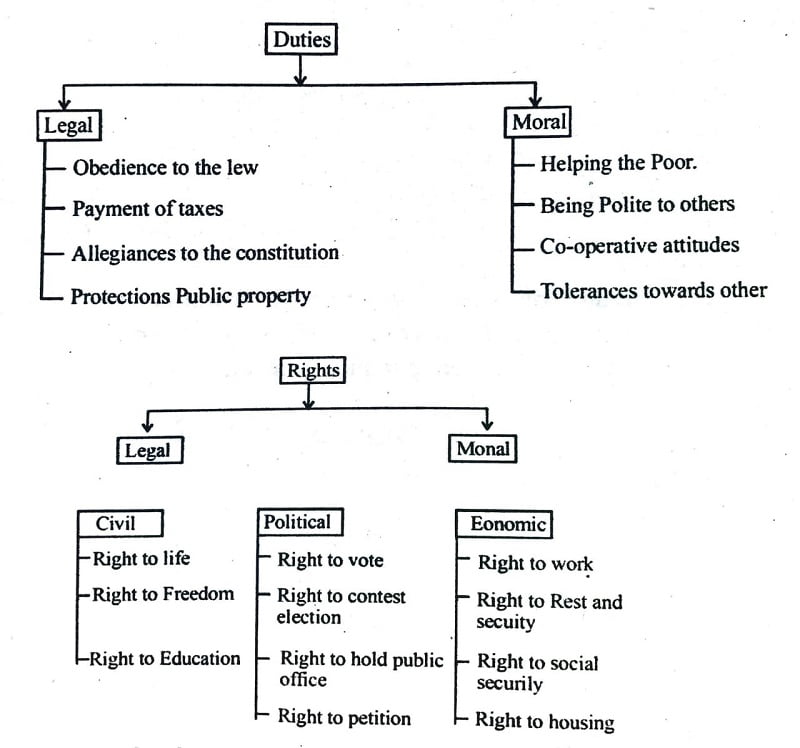Class 11 Political Science Chapter 15 Rights The answer to each chapter is provided in the list so that you can easily browse throughout different chapters NCERT Class 11 Political Science Chapter 15 Rights and select need one.
Class 11 Political Science Chapter 15 Rights
Also, you can read the SCERT book online in these sections Solutions by Expert Teachers as per SCERT (CBSE) Book guidelines. These solutions are part of SCERT All Subject Solutions. Here we have given Assam Board Class 11 Political Science Chapter 15 Rights Solutions for All Subjects, You can practice these here…
Rights
Chapter – 15
POLITICAL SCIENCE
TEXTUAL QUESTIONS AND ANSWERS
PART – B
Q.1. What us the historical theory of rights? Mention its importance.
Ans : According to this theory rights are the product of history –
(a) In due course of time, a custom due to practical utility becomes a right.
(b) Right have the sanction of the long unbroken customs of a society.
(c) State only conforms right which are sanctioned by the customs.
Importance :- It is true that most of the rights of the people are a result of the long established customs.
Q.2. What is Natural Rights?
Ans : The Natural Rights are those rights which have been given no the individuals by nature or God. In fact, these rights are basic natural and essential for the human beings, without which they cannot live and cannot progress. The right to life, right to liberty and the right to property in the state of nature are the natural rights.
Q.3. What do you mean by right to social security?
Ans : Right to social security assuring public assistance in times of old ape, injury, unemployment or disability in another right of modern citizen 4.
Q.4. Define duty?
Ans : Duty is an performance towards others. If there is a right from society there is the individual duty towards society.
Q.5. Write two fundamental duties of the citizens of India.
Ans : In 1979 the 42nd amendment was made in the constitution of India and ten fundamental duties of the citizens of India were addend in the constitution out of these ten the two are describe below) It is the duty of every citizen to abide by the constitution and respect its deals and institution, the national flag and the national anthem.
(b) It is the duty of every citizen to promote harmony and the spirit of common brotherhood amongst all the people of India transcending religions linguistic and regional or sectional diversities to renounce practices derogatory to the dignity of woman.
Q.6. Define Right of property.
Ans : Right to property is another right of a citizen. Property provides citizens with incentives to work to achieve their desired goals. It provides conditions of comfort to/be living in which men are able to perform their assigned tasks. Property may be immovable like house and farms and movable like cash, Jewellery and furniture.
Q.7. Define Right to Freedom.
Ans : Right to freedom is an another important Right to a citizen. This right means freedom of speech, thought, expression, of process of assembly or association with out arms. Right to freedom has certain restrictions. It is exercised within the frame work of public order, moralny, decency and unity of the country.
Q.8. Mention any two kinds of rights.
Ans : The two kinds of rights are mentioned below :
(a) Political Rights :- In the modern times, in most of the countries the world the democratic form of government is functioning. In the democratic government the citizens get many political rights. The politica right to contest elections, the right to hold public offices, the right to fom political parties and right to equality before law. The political right are great importance. If is with the help of these rights that an individual go the right to participate in th. affair of the state.
(b) Economic Rights :- The modern state great many economic Rights As citizens. Some of the economic Rights are the right to work the right adequate wages, the right to property, etc. For the development and Progress of the people economic right have much importance.
Q.9. Explain any two socio economic rights.
Ans: The two socio economic rights demanded by the people are –
Right to adopt the profession of one’s liking : In the modem welfare state every citizen gets the fundamental right that he can adopt profession of his liking. Neither government nor any individual can compel my person to adopt any profession.
(b) Right to work :- In the modern world no person can live without doing some work by which he earn his livelihood. It is duty of every state provide work to all its citizens. Since every responsible state shoulders the responsibility of making is citizens morally and materially fit for the struggle of life. It has to see that they have work enough to give them a decent living
Q.10. Define Right to life.
Ans : The right to life is one of the important rights of a citizen in e modern state. This means right to live without fear, without injury and with out my external danger. Even the individual himself does not possess the right to take away his own life. In fact it is a crime to attempt suicide.
Q.11. Describe any two political rights of a citizen?
Ans : The two political rights of citizens are as follows:
(i) Right to vote :- Right to vote is the most important polítical right. It is through the exercise of this right that citizens in democracy take in the government formation of the country. Criminals, bankrupts, lunatics and aliens are not given the right to vote. In most of the country. Criminals, bankrupts, lunatics and aliens are not given the right to vote. In most of the modern state, every adult person man or woman is given the right to vote.
(ii) Right to contest Electrons :- Every voter is normally given the right to be elected to the local bounds and state or central legislature certain states sometimes impose certain resonations for being elected to the legislative bodies. This right is given equally to all the citizen of the state.
| Sl. No. | সূচী-পত্ৰ |
| Unit 1 | PART – A |
| Chapter 1 | Constitution: Why and How? |
| Chapter 2 | Rights in the Indian Constitution |
| Chapter 3 | System of Representational Democracy |
| Chapter 4 | Executive |
| Chapter 5 | Legislature |
| Chapter 6 | Judiciary |
| Chapter 7 | Federalism |
| Chapter 8 | Local Government |
| Chapter 9 | Constitution as a Living Document |
| Chapter 10 | The Philosophy of the Constitution |
| Unit 2 | PART – B |
| Chapter 1 | Introduction to Political Theory |
| Chapter 2 | Freedom |
| Chapter 3 | Equality |
| Chapter 4 | Social Justice |
| Chapter 5 | Rights |
| Chapter 6 | Citizenship |
| Chapter 7 | Nationalism |
| Chapter 8 | Secularism |
| Chapter 9 | Peace |
| Chapter 10 | Development |
Q.12. Define rights? Distinguish between a right and claims.
Ans : Definition of right :- (i) ‘Rights are those conditions of social life with out which no man can reek to be himself at his best.’ H.J. Lask
(ii) A right is a claim recognized by the society and enforced by the state.’ – Bosanquet.
(iii) “Right means one’s capacity of taking work from some other person and prohibiting them from doing same work.”
Difference between Right and claim:
| Claim | Right |
| (i) It is a demand backed by Personal coercive of the individual. | (i) It is a claim backed by disinterested desired. |
| (ii) Being an unreasonable demand it may not be accepted by the society. | (ii) It received recognition. |
| (iii) It aims at only personal welfare. | (iii) It involves the good of all. |
Q.13. Give an account of classification of rights. Or How rights are classified?
Ans : Rights are classified into two types :-
(a) Moral Right.
(b) Right Legal.
(a) Moral Right :- Rights which we have due to one moral sense are known as moral rights e.g. our parents have a right to be helped by thein children when they are old. Moral rights cannot be demanded or it cannot) be forced. If moral rights are violated no legal action can be taken.
(b) Legal Rights :- A legal right is her right recognised by the states, 1 Legal right are the product of law. Legal right, are always enforceable, The legal Rights can be divided further in to 3 rights:
(i) Civil Rights.
(ii) Political Rights.and
(iii) Economic Rights.
(i) Civil Rights :- Civil Rights are given only to the citizens of the country like right to life and educational right.
(ii) Political Rights :- Political rights are given only to the citizens of country like right to vote, rights to contest any election like legislative, wal bodies, rights to petition come under this rights.
(iii) Economic Rights :- (a) Right to work.
(b) Right to rest.
(c) Right to housing.
(d) Right for buy own property in any part of the country.
(e) Right to take jobs any where in the country etc.

Q.14. Describe the fundamental duties of the lodian citizens.
Ans : The fundamental duties of the Indian citizen are i) It is the duty of every citizen to abide by the constitution and respect its ideas and institutions, the national flag and the national anthem
(ii) It is the duty to cherish and follow the noble ideals which inspired national struggle for freedom.
(iii) It is the duty to uphold and protect the sovereignty, unity and integrity of India.
(iv) It is the duty of every citizen to defend the country and rendere when called upon to do.
(v) It is the duty to promote harmony and the spirit of common brotherhood amongst all the people of India transcending religious, linguistic and regional or sectional diversities to renounce practice derogatory to the dignity of women.
(vi) It is the duty to protect and improve the natural environment including forests, lakes, rivers and wild life and have conception of living creatures.
(vii) It is the duty of every citizen to preserve the rich heritage of our composite culture.
(viii) It is the duty of every citizen to develop the scientific temper , humanism and the spirit of inquiry and reform.
(ix) It is the duty of every citizen to safeguard public property and to adjure violence.
(x) It is the duty of every citizen to strive towards excellence in all spheres of individuals and collective activity so that the nation constantly rises to higher levels of endeavour and achievements.

Hi, I’m Dev Kirtonia, Founder & CEO of Dev Library. A website that provides all SCERT, NCERT 3 to 12, and BA, B.com, B.Sc, and Computer Science with Post Graduate Notes & Suggestions, Novel, eBooks, Biography, Quotes, Study Materials, and more.



